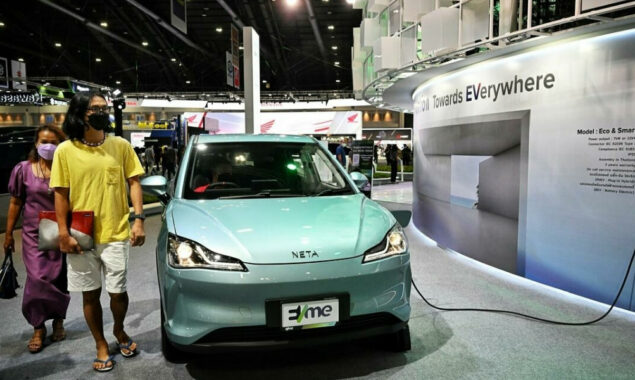
Dirty liberal pipe-dream: 3 myths about electric cars
Electric cars, critics argue, are a liberal pipe-dream with overstated environmental benefits, rather than helping to preserve the globe.
Even though there is no such thing as an entirely green vehicle, research demonstrates that battery-powered vehicles emit fewer damaging greenhouse gases than their gasoline-powered counterparts.
Three prevalent assertions about them were investigated by AFP Fact Check.
“Coal Powered Electric Cars…. Helping leftists pretend they are tackling a make-believe catastrophe,” reads a Facebook post with a photo of cars linked into a charging station.
The meme asserts that because coal is used to power the electricity grid, electric cars do not help to reduce climate-changing greenhouse gas emissions.
On its website, the US Environmental Protection Agency includes a calculation tool that compares the emissions of a gasoline automobile to those of an electric car depending on where it is charged.
It estimates that an electric car fueled in St Louis, Missouri, which is part of the coal-dependent subregion, will emit 247 grams of carbon dioxide each mile, compared to 381 grams for a gasoline vehicle.
Carbon Brief experts believe that the emissions of an electric automobile are dependent on the region or country in which it is charged.
They would be higher in Poland or in an Asian country where more coal is burned than in France, where most electricity comes from nuclear power.
Overall, the International Council on Clean Transportation (ICCT) discovered that electric automobiles create less pollution than their gasoline-powered counterparts throughout their life cycle, from mining to recycling.
According to the US Department of Energy and other sources, an electric car uses far less energy than a gasoline-powered vehicle.
Making the batteries for the vehicles is an energy-intensive operation that includes mining and trucking raw materials, assembly in factories, and shipment around the world. It is expensive to recycle them.
Another Facebook meme stated that it takes 500,000 pounds (227 metric tonnes) of the earth to obtain the metals for one electric car battery.
The estimate appeared to originate from a 2020 analysis by the Manhattan Institute, a climate-skeptic research group.
Several experts consulted by AFP said the figures were misleading. Peter Newman, professor of sustainability at Australia’s Curtin University, judged it a “gross exaggeration” and said the quantity mined would vary depending on geography and the type of battery.
Mining has other impacts not immediately related to the global climate. About 70 percent of cobalt — a battery ingredient — comes from the Democratic Republic of Congo, where the use of child labor in mines has been documented.
Access to the ingredients also raises strategic supply concerns, with many of the raw materials held by China, according to the International Energy Agency.
Georg Bieker, a Berlin-based researcher at the ICCT, said the environmental damage from oil drilling made gasoline production no better.
The risk of devastation driven by greenhouse gas emissions, projected in recent reports by the UN Intergovernmental Panel on Climate Change, would be even worse.
“It is correct to demand improvements, e.g. as considered by voluntary standards in the industry and by mandatory due diligence requirements that are foreseen in the upcoming EU battery regulation,” he said.
“In any case, it’s clear that the social and environmental impact of global warming is catastrophic, at a different scale than the mining of battery raw materials.”
‘Stuck in the snow’
After a snowstorm stranded hundreds of motorists in Virginia in January, users on Facebook shared posts warning that electric vehicles would run out of power and make the traffic jam even worse.
“All those people would be stuck in freezing temperatures without a heated vehicle. And all the cars would be stuck unable to move because you can’t bring a charging station to them,” read the text.
“All those electric cars would become roadblocks to the gasoline-powered vehicles.”
Several fact-checking organizations scrutinized the claim. They found there was no evidence that electric cars would fare worse in a storm.
Studies such as one published in 2015 by the American Chemical Society have found that electric vehicles do consume energy less efficiently when driving in the cold.
However, according to several experts, if stranded in a storm, an electric vehicle would use less energy than a gasoline vehicle, which would have to keep its engine running to power the heater.
Consumer magazine in the United Kingdom Which? put an electric SUV through its paces by simulating a traffic jam with the car’s radio, air conditioning, seat heating, and headlights turned on, as well as a plugged-in tablet device showing a movie.
In an hour and a quarter, that took up less than 2% of the battery, or about eight miles of range – admittedly in hot weather.
Read More News On
Catch all the International News, Breaking News Event and Latest News Updates on The BOL News
Download The BOL News App to get the Daily News Update & Follow us on Google News.




